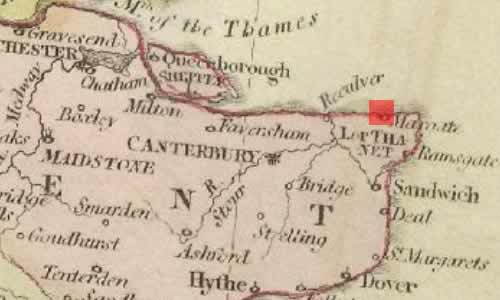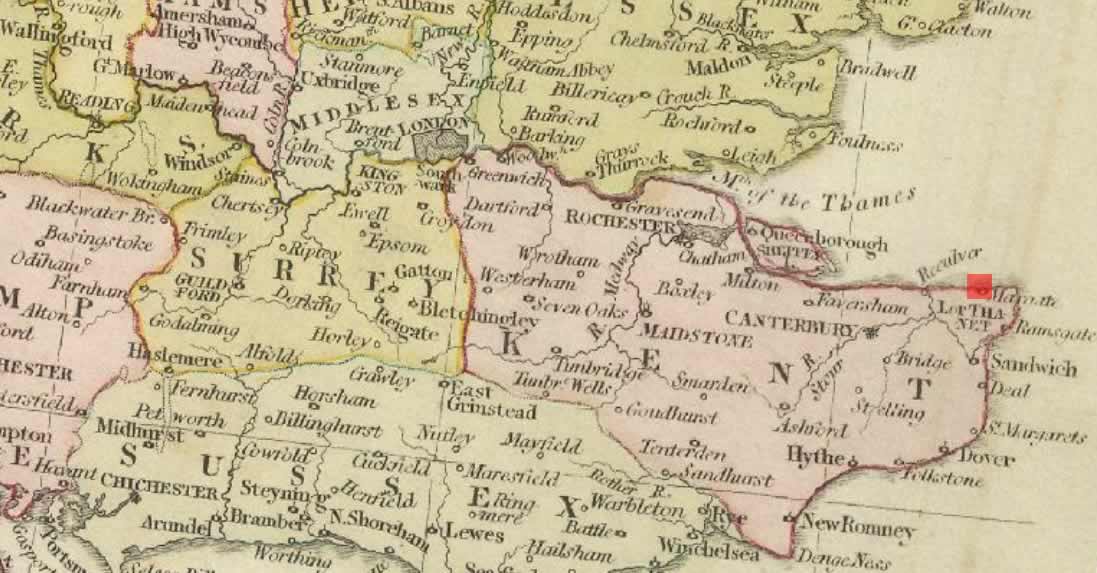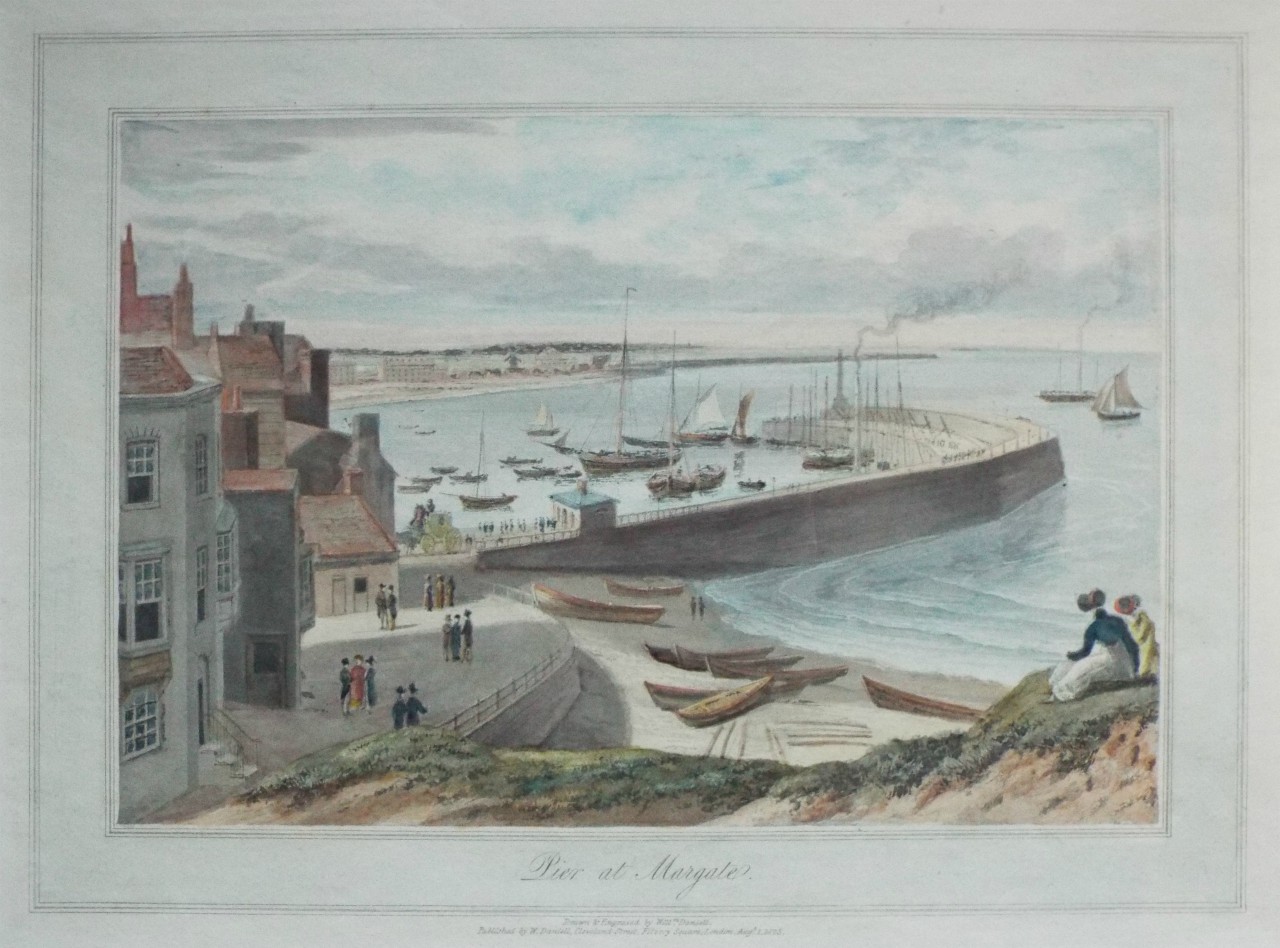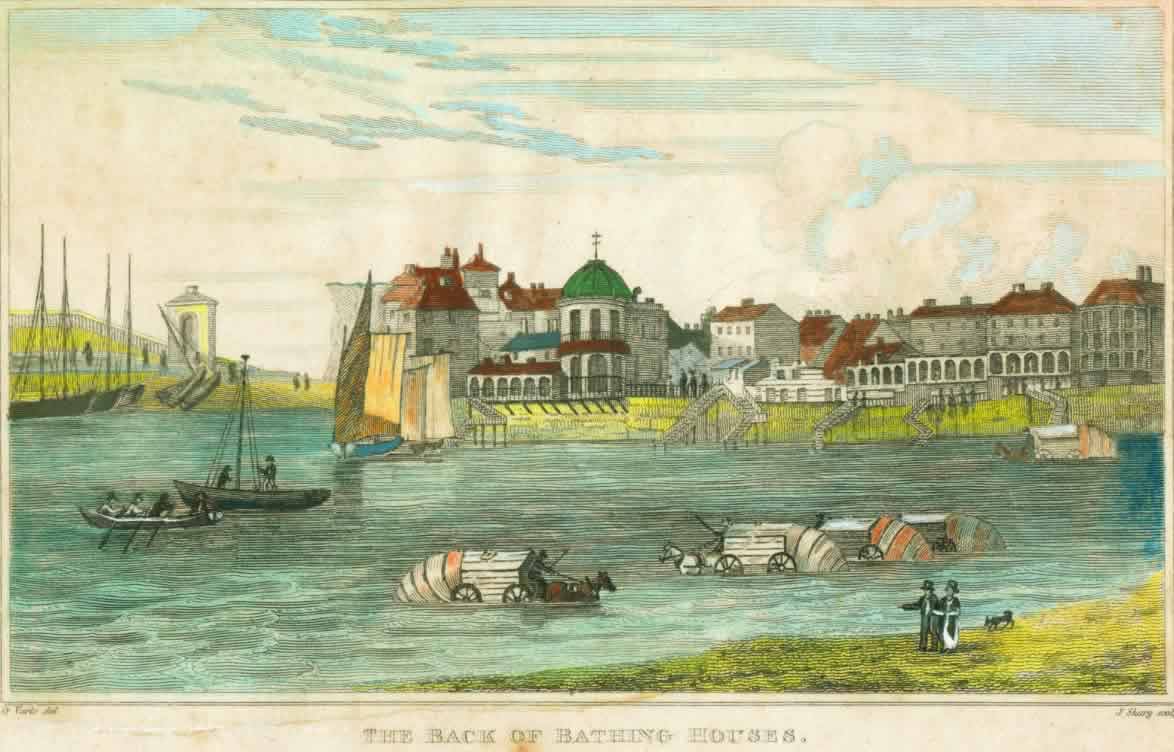August-September 1816: Margate & Scarce Knowing His Poetic Intent
Margate


By steamer, Keats takes his younger brother, Tom, to the popular seaside destination of Margate. Tom, who is four years younger than Keats, has shown what seem to be precursor symptoms of consumption—tuberculosis. The symptoms of the disease can sometimes show a gradual, lingering presence before full onset.
We might imagine Keats wandering around the trendy resort town while also exploring the striking coastline. He takes some of his perspective of the area upon a high cliff, overlooking the sea. No doubt he thinks about public popularity, and he has little choice but to take some measure of middle-class, touristy preoccupations that surround him—yet, given his growing poetic aspirations, all of this has to be seen in light of the strings of what immortal nature and his budding mortal imagination poetically play to each other. These are the worlds that young Keats, at this point, struggles to place beside (or within?) each other. Margate, then, at this point might be a place to mull poetic purpose, poetic readiness, and poetic potential. Or, perhaps, flipping back again, Keats has in mind the idea that sea-bathing and sea air have some medical and curative properties, which was an idea that many well-do-to Londoners held as their purpose in visiting Margate. One might do worse than think of the odd but wonderful novel of 1813, with the exuberant title of Margate!!! or Sketches Amply Descriptive of that Celebrated Place of Resort, with its Environs, and Calculated to Inculcate in the Mind of Youth a Fondness for the Productions of Nature and Art, by Mrs. Pilkington. Yes, Keats might think: Nature and Art . . . .


Here Keats writes an epistle poem to his other brother, George (To
My Brother George). Like other poems written at this time that end up in his
first volume of poetry, Poems (1817), this one also expresses
Keats’s desires about being a poet and the meaning of poetic fame (my mad ambition,
he
calls it—line 110), subjects that in fact clog up much of his early poetry. Keats
is even
confused about social relevance of his projected role of poet. In short, it is a vaguely
inspired poem about the desire for inspiration.
Keats takes a two-volume edition of William Wordsworth’s poetry with him on the trip, which, importantly, signals coming poetic development. Keats would hardly have believed it at the time, but he will eventually meet Wordsworth (already a living legend) a number of times at a crucial moment in his poetic progress, in late 1817 and into early 1818, when Keats begins to understand the limitations of his own early poetry. He will come to determine what he believes he can profitably take from Wordsworth (the poet’s philosophical depths that articulates an understanding of loss, suffering, and the connection between nature and human nature) and what he will attempt to avoid (a dominating subjectivity).
In this poem to George, as well as in a second
poem written in Margate (To C.[harles] C.[owden] Clarke),
it is clear that Keats holds Leigh Hunt
(Libertas
—44) in high esteem for his independence of mind and his ease with poetry.
However, Hunt’s poetic influence will in some ways remain a sticky point in the path
of
Keats’s poetic development, and thus it is more against rather than with Hunt that
Keats later
develops his very best poetry; that is, Keats becomes very conscious of the necessity
to go
not just beyond Hunt but in a different direction. Keats also becomes aware that association
with Hunt (who, via his paper, The Examiner, strongly
represents liberal and reformist side of major social and political issues) will make
Keats
vulnerable to nasty and partisan criticism from Tory quarters. On the plus side, the
Huntian
impulses of sociability and poetry as entertainment no doubt loosen and force the
practice of
Keats’s pen, but these also, for the moment, highlight his need to develop a less
affected
style and to avoid random, ineffectual topics.
The poem to Clarke is a genuinely heartfelt
acknowledgment of how Clarke directed Keats’s early tastes in poetry, poetic forms
(pleasures . . . of rhymes and measures
—97-98), music (Mozart, Arne, Handel), and
even the impulses of liberty. In the poem, Keats also worries over his lagging, uncertain
poetic progress: he pictures himself sailing on the stream of rhyme [. . .] scarce knowing
my intent
(16-18). What is at least a little impressive the range of poetry to which
Clarke exposes Keats. Keats at this point can only imagine paying back the debt to
Clarke by,
some day, composing verses of rich content
(76-83). Indeed, he will return the favor,
in that he will, in few years, have poetically developed enough to manage rich content
with extraordinary tonal control, with intensity that can controls excess—and with
purposes
greater than confined, random moments of response, and without the necessity of sprinkling
literary and classical over top if his poetry, as if to provide cultural cache. But
by then
Clarke will no longer be part of Keats’s impressive London circle, but it will be
Clarke who,
by connecting Keats with Hunt, places Keats into
that circle.
But more about this sense of confined response. During this phase in this poetic career, Keats’s larger vision is somewhat bogged down in romance, and while he is steeped in knightly and chivalric imagery, themes, and narrative, no substantive work results from these mainly Spenserian enthusiasms. Keats would like to blame the influence of the city for his inability to write weighty poetry, but it is also the result of other circumstances: his relative immaturity and inexperience; his early infatuations with, for example, those chivalric portrayals and motifs; the temptation of random and occasional topics; a tendency toward overwriting and affective wording and sentiment; an effusive interest in fame and greatness; an undeveloped poetics; and his lack of digging into and understanding style and depths of poets like Milton, Wordsworth, and Shakespeare. But give him time, though not much: twenty-year-old Keats will get there in just over two years.
There is also a deeper more complex aspect of Spenser that Keats has not yet engaged: the tensions and relationship between the ideal and the real, which is often not to far from Keats’s poetic interests.

Not long after returning from Margate, Keats meets Hunt in October 1816 (as mentioned, via Clarke). Keats anticipates that this meeting
will mark an Era in my existence
(letters, 9 Oct). Indeed, the meeting immediately
changes his London life and his poetic career extraordinarily, since his new associations
(through and including Hunt) will support, guide, and challenge his poetic directions.
Keats will return to Margate in less than a year, hoping to gain some momentum in order to get on with his largest poetic project, Endymion. His powers of imaginative invention (using a bare-bones plot lifted from a myth) will be challenged over a projected 4,000 lines—so will his powers of rhyme, since he will write it in heroic couplets, meaning 2,000 rhymes. For Keats, completing the poem is a serious accomplishment; the great accomplishment will be leaving it behind in recognition of not what to do again. Foundering is part of the story of progress.

